|
|
 |
Civil Society Forum on Human Rights |
| CSFHR e-Newsletter |
| VOLUME- I ISSUE- 6 June-July 2015 |
|
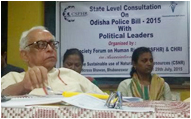 |
|
|
|
| |
|
| |
Dear Readers,
We would like to heartily welcome you to the sixth issue of the Newsletter of CSFHR.
This Newsletter, aimed at both publicizing the ongoing CSFHR activities and events and providing news on Human Rights Violations and Human Rights Institutions. The editors are hoping to be able to issue more qualitative and informative newsletter and are therefore looking forward to your valuable contributions in the form of suggestions, news and articles. We will be glad to publish them in our next issue. This time, we have come up with the bimonthly newsletter, combining news and events from June and July. This edition will familiarize you with the regular features and activities of CSFHR during the last two months.
We hope that you will find this Newsletter both interesting and informative.
We wish our readers happy a reading!
CSFHR Team |
| |
|
|
| |
|
| |
49 child laborers rescued in Odisha
49 child workers, including 20 from Bihar, have been rescued from small -scale units in Ganjam and Gajapati districts of Odisha. Similarly 22 children, including 20 from Bihar, who were working in small manufacturing and sugarcane juice processing units in Berhampur, were rescued during a raid by a district- level monitoring committee squad.
See more
Speech Impaired Woman Gang raped in Puri
At puri a speech impaired destitute woman was gangraped in an under-construction shop near Jagannath Temple during wee hours of the day. The victim was found to be three-month pregnant. The woman, in her late 20s, was spotted by a local trader who was opening his shop in Dola Mandap Sahi, a few hundred metres from the main gate of the temple. Police registered a case suo motu basing on the report of the local shop-keeper and arrested a 26-year-old daily wager Mahavir Rana from the spot. The girl was sent for medical examination and the medical report said the girl was pregnant and confirmed rape.
See more
Girl Rescued from Being Trafficked
A girl, of Nileswar village under Bargarh Sadar police limits was rescued from Jharsuguda railway station before being trafficked and two middlemen accompanying her have been arrested. Bargarh Sadar Police registered a case under Section 366, 420 and 34 of IPC. The two middlemen have been identified as Banmali Bhoi and Amin Saha of Majhipali village under Bijepur police limits of Bargarh district. According to police, the middlemen had promised Kamla’s grandfather to marry off the girl and paid him Rs.12, 000.
See more
Baby 'Sold' by Mother Rescue
The Child Welfare Committee (CWC) of Cuttack district has rescued a 13-day-old child who was allegedly ‘sold off’ by her mother at Choudwar’s Salagram since she could not fend for herself and her family. The infant’s custody has been given to Vasundhara. The woman, Tikili Barik, who works as a house maid, is alleged to have handed over three children in the past too.
See more
Disabled body to file SLP in Apex Court
The Institute of Social Work and Research (ISWAR), a forum fighting for the cause of physically-disabled and visually impaired persons, has decided to move the Supreme Court after the Odisha High Court disallowed a petition regarding proper reservation facility to visually-impaired persons in the Odisha Public Service Commission (OPSC) examinations. The HC has directed the petitioner to move to the State Administrative Tribunal (SAT) citing the latter is the appropriate forum. One Sujata Jena of Human Rights Law Network had moved the High Court alleging that Article 16 of the Constitution has been violated as the OPSC in its fresh advertisement has ignored one per cent post for the visually impaired persons.
See more
14-yr old Odisha girl being married off to 40-yr old man rescued
In Nayagarh district, Family members of a 14-year-old girl were allegedly trying to marry her off to a 40-year-old man from the same vicinity. Following a tip off by locals and acting on the order of the collector Hemant Kumar Padhy, the district administration, led by Deputy Collector Nrusingha Charan Swain, Bhapur Block Child and Women welfare officer, Nayagarh Police SDPO and Phatehgarh Police, raided the place in Badasahara Panchayat under Bhapur block of Nayagarh and rescued the girl.
See more
Top Management officers of Bhushan Steel were imposed Rs 14 lakh fine for violating safety norms
A court in Dhenkanal town, 100 km from here, on Tuesday imposed Rs 14 lakh fine on two top management level officers of Bhushan Steel Limited at Kantabania in Dhenkanal district for violation of safety norms in seven different cases. Public prosecutor Ranjan Pradhan said chief judicial magistrate Rekha Prasad awarded Rs one lakh fine each on factory occupier Rahul Sengupta and manager Satish Tyagi in each of the seven cases, making the total fine amount Rs 14 lakh. The cases registered between 2008 and 2009 pertain to violation of provisions of Orissa Factories Rules, 1950, and the Factories Act, 1948 leading to fatal mishaps.
See more
Man Dies of 'Custodial Torture' in Ganjam District
Tension ran high in Patadhar village under Jagannath prasad block of Ganjam district following the death of a villager, Gourahari Swain (40), allegedly due to custodial torture. In a written complaint to Ganjam SP Narasingha Bhol, wife of Gourahari, Kuntilata alleged that personnel from the Jagannath prasad police station had taken her husband from their house and physically assaulted him. The Police dragged the victim out of his house at around 11 pm and took him to the police station on charges of his involvement in a theft case that had taken place in a nearby village, as said by his wife. Gourahari was brought by the police to the community health centre (CHC) at Jagannathprasad with multiple injuries and 30 minutes later, he succumbed.
See more
|
| NHRIs/SHRIs in News |
| |
Panel Seeks Report from Government on Status of Toilet in Schools
The Odisha State Commission for Protection of Child Rights (OSCPCR) has sought a report from the State Government by July 15 on the status of construction of toilets in schools after it failed to meet the deadline.
In a letter to Secretary, School and Mass Education Department Ranjana Chopra, Chairperson of OSCPCR Rajendra Meher said inspite of all the mechanism, Government has failed to meet the target within the stipulated period. The deadline for construction of toilets in Odisha has been extended by 15 days after the State Government failed to achieve the target by June 30.
See more
Six members of a family killed on allegations of practicing witchcraft in Odisha: NHRC notices to DM and SP, Keonjhar
The National Human Rights Commission has issued a notice, returnable in two weeks, to the District Magistrate and Superintendent of Police, Keonjhar, Odisha after taking suo motu cognizance of a media report that on allegations of practicing witchcraft, six members of a family were hacked to death while two others were seriously injured at Mundashahi village in the district on the 12th July, 2015. The dead included the head of the family, Gura Munda, his wife, two daughters and two sons.
The Commission has observed that the contents of the media report, if true raise a serious issue of violation of human rights of the victim and his family.
See more
NHRC Seeks Report on Kandhamal Kidney Sale
Taking stern note of rising incidents of kidney sale in the State, the National Human Rights Commission (NHRC) has sought a report from the Government on the latest happening where a poverty-stricken Dalit youth of Kandhamal parted with his organ for money. The Commission has directed the Collector and the SP of Kandhamal to file their reports within four weeks. The State Government has also ordered a Crime Branch probe into the whole incident establishing the entire trail from tracking Kanhu and the recipient, middleman racket, involvement of local hospital or doctor, arranging passport and travel documents and visit to Sri Lanka for surgery.
See more
NHRC seeks ATR on pregnant Odisha woman thrown off train
Expressing dissatisfaction over the inaction of the police in the arrest of the accused, who had pushed his pregnant wife out of a moving train in Odisha’s Rayagada district on May 26 this year, the National Human Rights Commission (NHRC) on Tuesday asked the district SP to submit an action taken report (ATR) on the case.
See more
OHRC Seeks Report on Ganjam Lockup Death
A day after the alleged custodial death of a 28-year-old man at Jagannathprasad police station in Ganjam district, the Odisha Human Rights Commission directed the Collector and SP to file detailed reports on the matter. Taking suo motu cognisance of media reports, the Commission has directed the district authorities to submit the reports within four weeks. Acting chairperson Justice BK Mishra contended the reports disclose a case of custodial death due to police torture, raising questions of violation of the human rights of the deceased. The Collector and SP should file separate reports before the next date of hearing on July 13, he ordered. They have alleged that the police had subjected Gourahari to third degree torture, which led to his death.
See more
Bolangir custodial death: NHRC seeks Odisha govt reply on compensation
The National Human Rights Commission (NHRC) has issued a show-cause notice to the Odisha government as to why a monetary compensation of Rs Five lakh should not be recommended to be paid to the next of kin of deceased Basanta Pradhan, a victim of custodial torture at the Balangir police station. The national human rights watchdog has directed the chief secretary to respond to its notice in this regard within six weeks. Adjudicating separate petitions filed by advocate Prabir Kumar Das, rights activists Manoj Kumar Jena and Jayanta Das and others, the NHRC issued show-cause notice to the state government.
See more
Rights body looks into torture of activists
The Odisha Human Rights Commission (OHRC) has directed the Railway IG to enquire and submit a report within a month about the allegation against the Inspector in charge (IIC) of Cuttack GRP for illegally arresting six SUCI activists, including a woman and allegedly torturing them in custody.
See more |
| |
| Important Judgements/ Orders/ Observations |
| |
Unwed mothers don't need father's consent for guardianship of child, says Supreme Court
In a landmark judgement, the Supreme Court on Monday ruled that there was no need for the consent of the father in giving guardianship of a child to an unwed mother.
The apex court bench headed by Justice Vikramajit Sen made this statement while recalling the earlier order of a guardianship court and asking it to re-examine the plea by the unwed mother seeking guardianship of the child without issuing notice to the father.
The court said that the lower courts, including high court, lost sight of the issue that was before them to be examined and decided the matter without taking into account the welfare of the child.
See more
Cover Third Gender under Food Act: OHRC
In a significant order, Odisha Human Rights Commission (OHRC) on Monday directed the State Government to ensure inclusion of transgenders in the National Food Security Act and extension of same benefits to them.
Commission’s acting Chairperson Justice BK Mishra has asked the Government to include the transgenders in the targeted public distribution system list which is set to be completed and finalised by the end of September, 2015. The enumeration of transgenders should be done and access to food provided to everyone who comes within the category of entitled persons as per the guidelines of the State Government.
The Commission has asked the State Chief Secretary and secretaries of Food Supplies and Consumer Welfare and Social Security and Empowerment of Persons with Disabilities departments to submit their action taken report within six weeks.
See more
OSCPCR workshop on rehabilitation of children
Rajendra Meher, chairperson of Odisha commission for protection of child right [OSCPCR] emphasized on the reintegration and rehabilitation of children of migration labor who forgo formal education due to migration of their parents.
Meher was addressing a workshop conducted by Odisha State Commission for Protection of Child Rights, (OSCPCR), OPEPA and UNICEF and attended by officials and volunteers of six district Balangir, Bargarh, Boudha, Kalahandi, Nuapada and Subarnapur here to discuss issue related to ordeal face by children of migrant families.
See more
Over 9,700 women rights violation cases since April this year: Maneka Gandhi
More than 9,700 cases of atrocities against women, including domestic violence and rape, have been registered since April one this year, with Uttar Pradesh seeing the highest number of such cases, the government said on Friday. These many cases have been registered with the National Commission for Women so far this financial year.
Giving details in the Lok Sabha, Women and Child Development Minister Maneka Gandhi said reasons for violation of women rights include "domestic violence, outraging the modesty of women, dowry harassment, property dispute, rape.
See more
Bring acid attack survivors under Disability Act: NCW
The National Commission for Women (NCW) chairperson Lalitha Kumaramangalam on Monday supported the proposal of bringing acid attack survivors under the Disability Act cover so as to provide them privileges in jobs and education.
"We have recommended this to the Home Minister that acid attack survivors be brought within the ambit of the Persons with Disability Act so that they can get government jobs etc and he has agreed to look into it.
See more
Atrocities against SCs, STs: Odisha to Set up Three Special Courts
The Odisha government is taking steps to set up three special courts in Cuttack, Bolangir and Balasore districts to try cases of atrocities against SC and ST people. As said by Nabeen Pattnaik steps are being taken for establishment of three special courts each in Cuttack, Bolangir and Balasore districts for which funds have been provided for construction of court building addressing a state level vigilance committee.
See more |
| |
|
| |
NHRC asked Odisha Police to take necessary action in Namatara police firing case
The National Human Rights Commission (NHRC) has directed Superintendent of Police of Kendrapada to take necessary action in Namatara police firing and lathi charge case. Acting on the complaint of rights activist Akhand, the Commission has order the district police “to take appropriate action within 8 weeks and to inform the complainant of the action taken in the matter.” Odisha Police fired bullets upon some women who were demanding to close a wine shop in Namatara village under Kendrapara. On 8 March, the day of International Women Day, hundreds of women gathered and organised protest rally in front of the shop at around 12 0’lock. Police reached at the spot and started firing and resume lathi charge. Several people were injured in the police action. “They have several times organised dharana, protest rally and submitted memorandum to the district collector to cancel the license of the liquor shop. But all was in vain”, alleged Akhand.
NHRC directions to Special Operation Group, Odisha State Armed Force on safety of the residents of Daruthenga village
Civil Society Forum on Human Rights (CSFHR) has drawn attention of National Human Rights Commission towards the safety of residents of Daruthenga village on the outskirts of Bhubaneswar. At least 10 bullets were fired destroying walls of their houses on 3.1.2014 morning. The residents feared a terrorist attack but soon it was found that the bullets were fired from the camp of Special Operation Group (SOG) of Odisha State Armed Police, located around 1.5 kilometres away from the village. The Commission took cognizance on 18.2.2015 and directed to transmit the petition to the concerned authorities calling for a report in the matter. Pursuant to the directions of the Commission, the IG of Police (Operations), Odisha, Bhubaneswar has sent his report dated 27.4.2015. He admits, on the incident date, at about 10.30 A.M., 10 bullets got ricocheted on some hard surfaces like stone and flew off towards Daruthenga village. This incident took villagers by surprise and sent panic reactions. Keeping this incident in view, the Firing Range No.3 from where this ricocheting incident took place is permanently closed immediately. Precautionary measures were taken up in the other Firing Ranges to ensure absolute safety in and outside the Firing Ranges during firing practice. All precautionary measures are being taken to ensure that these kinds of incidents do not get repeated in future. |
| |
|
| |
| One day state level consultation with lawmakers and political parties on “Odisha Police Bill-2015 |
| |
One day state level consultation with lawmakers and political parties on “Odisha Police Bill-2015” was organised at Redcross Bhawan, Bhubaneswar on 29th July, 2015 (Wednesday). The key organisers of the state level consultation were Civil Society Forum on Human Rights (CSFHR) and Common Wealth Human Rights Initiative (CHRI). The main objectives of this one day consultation were: i. to discuss largely on Odisha Police Bill vs. Citizens’ needs ii. To find out the gaps in the inclusion of 7 directives by the Supreme Court, in Odisha Police Bill-2015. iii. To build public opinion towards a pro-people Police Act. Iv. To work-out a set of recommendations and to develop an action plan for necessary improvements in the Bill.
The political party leaders and many activists were invited to this Consultation. The consultation was attended by more than 50 participants. Shri Narasingh Mishra, Leader of Opposition, Odisha Legislative Assembly, Ganeshwar Behera, Chief Spokes persons, Odisha Pradesh Congress, Taraprasad Bahinipati, MLA(Congress), Pratap Sadangi, Vice President, State BJP, Pradip Purohit, MLA(BJP), Lekhashri Samantasinghar(BJP), Shri Panchanana Kanungo (Ex-Finance Minister),Suresh Panigrahy and Ali Kishore Pattanaik (Both from CPM), Prasanta Paikaray and Narayan Reddy(Both from CPI), Sivram (CPM-Redflag), Sudarshan Pradhan (Samajabadi Party), Nirmal Kumar Behera(Utkal Bharat), Yudhistir Mohapatra (CPIML), Rabi Das(Sr. Journalist), Prafulla Samantaray (Social worker) are among few noted personalities present in the Consultation.
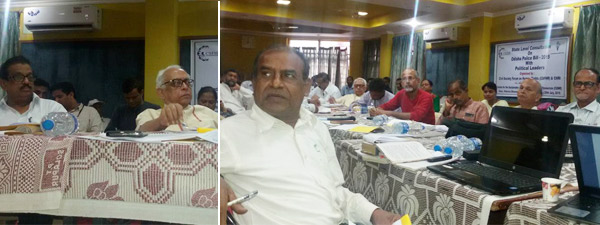
The decisions taken in the consultation were:
- An alternative Odisha Police Bill (to Odisha Police Bill – 2015) to be drafted by 10th of August and shared among the participating political party leaders, MLAs and others. After getting feedbacks from them, it will be submitted before the Leader of Opposition, Shri Narasingh Mishra for the needful follow up by 18th August. It was also decide that the Drafting committee will meet on the 5th of the August to work-out an alternative bill and do an analysis of the present Bill (clause wise analysis)
- The existing Odisha Police Bill-2015 will be analysed (with clause-wise comments) and will be shared among the concerned people.
- After receiving feedbacks from them, it will be modified and submitted with MLAs for necessary follow up at their level by 18th August.
- It will be demanded that the Government should make interim arrangements (issuing Executive Orders until a pro-people Act comes into force) to get Supreme Court Directives implemented in Odisha without further delay.
- An ‘Alternative Bill Drafting Committee’ was formed with Shri Panchanan Kanungo (Ex-Finance Minister, Odisha), Shri Ganeswar Behera (Spokesperson, Congress), Smt. Lekhasri Samantasinghar (BJP leader), Rabi Das (Senior Journalist), Shri Prafulla Samantara (President, Loka Shakti Abhijan), Shri Ajaya Jena (Former MLA) Shri Chitta Behera (Expert), Shri Biswapriya Kanungo (Human Rights Advocate) and Shri Dhirendra Panda( CSFHR) as Convener.
|
| |
| Two days Follow-up Training on Fact Finding and Documentation of Sexual Assault Cases |
| |
With the purpose of strengthening civil society and looking into the increasing incidents of atrocities against women in the state, a three days long training on Fact Finding and Documentation of Sexual Assault cases was organized by the joint collaboration of Civil Society Forum on Human Rights (CSFHR) and National Alliance of Women (NAWO) with support of Odisha State Commission for Women (OSCW) on 30th July to 1st August 2014.
|
| |
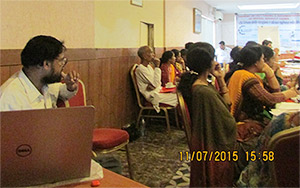 |
In continuation with this the Follow up Training on Fact finding and documentation on sexual assault cases with an aim to further strengthen the capacities of the trained HRDs was organised on 11th -12th July 2014. The training was held at Hotel Sun Green, Satyanagar, Bhubaneswar, with forty four participants, mainly human rights defenders from different districts. The different Key organizers were Civil Society Forum on Human Rights (CSFHR), National Alliance of Women (NAWO), and Jana Vikas, in joint collaboration with Odisha State Commission for Women (OSCW). The training was supported by Troicaire.
The objectives of the follow up Training were: i)To review and enhance participants’ competences (knowledge, skills, attitudes) in monitoring of cases of sexual abuse, identify the gaps and to boost the skills, knowledge and methods to be used in fact finding
|
| ii)To broaden further the trainees’ knowledge of human rights, fact finding framework, concepts, theory, and practice. iii) To further acquaint with legal mechanisms, covenants, and principles available for addressing cases of sexual abuse iv) To motivate and empower the participants. |
| |
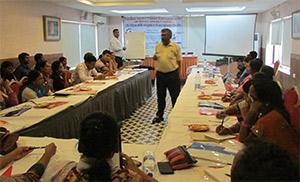 |
The follow up and action plan prepared were:
1) A new team was formed and it was taken a decision to meet the group in every 6 months.
2) The team was formed zone wise.
3) The manual of sexual assault will be shared by the team members.
4) A petition will be filed and signature of all the participants will be collected and be given to the Chairperson of the Commission regarding the monitoring, the health aspect of all the children, in the Ashram schools. Another petition will be filed demanding a separate room for the rape victims, in the hospitals.
5) All the participants who are not in Odishahrd Google group will be added to the group.
|
|
|
| SHRI Study Report Sharing Workshop |
| |
| A workshop to share the study reports on functioning of Odisha Human rights Commission and Odisha State Commission for Women was organized by Civil Society Forum on Human Rights (CSFHR) / CSNR at DRTC- CYSD, Bhubaneswar, on 25th July, 2015. The purpose of the workshop was to welcome the suggestions and feedbacks for further improvement and finalization of the reports. |
| |
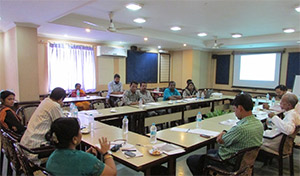 |
Some of the suggestions on the Odisha Human Rights Commission study Report were 1) separation of the investigative wing of the OHRC from Home Ministry. 2) Independence of the Commission with regard to recruitment; the Commission should recruit its own staff. 3) A complaint registered against police to be investigated by the Commission members solely and not by Police. 4) The Commission should make frequent visits to all the Ashram schools of Odisha and suggest government regarding the steps that could be taken for their improvement. 5) research work the Commission should be incorporated in the study report. 6) Number of camp courts the Commission has done since inception should be integrated in the report.
|
| |
|
7) There is excessive work burden on the Odisha Human Right Commission due to the increasing number of cases, so some special rapporteurs may be appointed in the commission to ease the work burden and carry out the functioning smoothly. 8) More emphasis on research work on human right issues should be given by the different commissions and they can take up research work jointly. 9) The government can be approached by the civil society with the recommendations that came out from the study.
Different Suggestions on the Odisha State Commission for Women Study Report were: 1) A separate analysis of the OSCW Act 1993 need to be done and incorporated in the report. 2) A comparative study of the OSCW Act 1993 with the NCW and the Women Commission acts of other states may be done to identify the gaps. The best directives and mandates from other acts can be suggested further in the recommendation section, to improve the OSCW act. Along with Paris principles and OSCW act, these other acts may be taken as standards to assess the functioning of the commission. 3)Also an analysis can be done on the functioning of the OSCW based on the NCW act and other women commission acts to find out if OSCW is also meeting those mandates or not. 4) The detailed procedure with description of selection criteria (mentioning the knowledge, skills, years of experience etc) should be mentioned in the Act. Recommendation should be made to the government with regard to this.5) One member should be well versed in tribal languages as the victims from the interior are not well versed in Odia and English. This will help in proper redress of the grievances. 6) Counselling: In order to avoid unnecessary confusion and strain the members should be well equipped to sort out the case in the preliminary stage. They should make it clear to the victims about the subsequent phases of justice delivery.( they should speak about their limitations to the victim, if the case needs to be transferred to some other department/courts etc or if the women commission needs help from other dept. Etc, everything needs to be detailed to the victim in the initial phase itself to reduce the high expectations ,stress and anxiety of the victims.7) The Commission should have a separate budget of its own.8) Salary structure: The salary of the chairpersons and the members is quiet less in comparison to the other commissions. That needs to be addressed.9) Capacity building training of the chairperson and members at regular intervals. Orientation on ethics, responsibilities and functioning should be given to the chairpersons, members and staffs before joining the post. 10) A regular monitoring of the functioning of the members and chairperson to be done by some impartial committee to keep a track of their level of competency and to see if they are meeting the expectations from them. |
| |
|
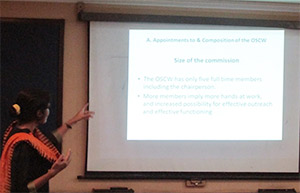 |
11) Monitoring and review of their activities (no. of complaints addressed, camp courts held, successfully solved cases, home and jail visits, outcomes etc) to be done 6 monthly/yearly by an independent committee.12) What role have they played in protection of elderly women and children in ashram schools? Study focussing on elderly women, situation of ashram schools may be done.13) Provision of online complaint filing.14) should have Women HRD protection mechanism. 15) Apart from NHRC, the other commissions are not at all participating in the UPR process. OSCW should participate in the UPR process and contribute.16) Should be trained about Gender Budgeting 17) Should make their Action Plan and Budgeting public. 18) The members are not aware about the various laws related to women which may hamper in the redress of the grievances. Sometimes they are not able to guide the victims properly due to lack of knowledge of the laws and provisions. Provision of Orientation and updating them with policies, laws etc at regular intervals must be done.
|
|
19) If the commission feels that there is excessive work burden on the 6 members (including chairperson) some special rapporteurs may be appointed in the commission to ease the work burden and carry out the functioning smoothly.
|
| |
|
| |
Force to service
Police needs to stop passing the buck for poor service to interfering politicians.
By: Maja Daruwala, Director,
Commonwealth Human Rights Initiative (CHRI) |
| |
The annual conference of the directors general of police will be held at the end of this month in Guwahati. Organised by the Intelligence Bureau, and not by the police establishment, the conference concentrates on insurgency and national security, rather than on everyday policing of the ordinary population, which should be a primary concern. Still, these conferences are rare moments when men of power and responsibility — there are few women in high police positions — can deliberate collectively. This time, a new prime minister will be putting his stamp on the occasion. It is time the political and police leadership had a sincere conversation on what is holding back reform. It is time to think about the relationship between the police and the political executive: how best to design it so that one does not impinge or enervate the other. The new and improved Model Police Bill, put forward by the Soli Sorabjee Committee, set up by the ministry of home affairs, offers a solution to this issue. It is time to lay out what the common principles of policing in a democracy should be. It cannot be punishment inflicted by force on behalf of the ruling regime.
Policing must be a service that is essential to the whole population: efficient, responsive, law-abiding and accountable. The obsession with status, postings and promotions should give way to a greater emphasis on improving police stations and chowkies. These are the basic and most important service units, and are closest to the population. There must be fundamental changes in recruitment practices and training curricula so as to bring in people and attitudes better suited to a new kind of policing. Many individual officers have generated good practices. But they remain experimental and ad hoc, given the presence of risk-averse leaderships and mean considerations of territoriality and credit. Actionable plans with set timetables must be put in place to improve diversity across the police establishment. The force should no longer be imaged as the preserve of machismo. This has brought no glory. It is time to detail how the force means to adapt its internal culture and attitudes to accommodate and mainstream women. With the national average of women in the police force at about 7 per cent, no one can claim the force is gender friendly or “inclusive”. It is useless to blame women for not joining. The police must examine why it is so unwelcoming to about half of the country’s workforce. The excuse that the British left behind militaristic policing has worn thin after 67 years. We need to own up to the fact that the leadership is comfortable with this design and has perpetuated its feudalism. The police needs to stop passing the buck for sub-standard service to interfering politicians, scheming bureaucrats and a dilatory judiciary. There are problems whose solutions lie in the hands of the police leadership and not of any outside agency: for instance, accountability. It is imperative to revamp internal systems of accountability, seen as secretive, unfair and patronage-driven, and put in place systems that distinguish between disciplinary breaches, poor service delivery and outright criminality. But the police must also stop being bitter about external mechanisms of accountability like courts, human rights commissions and the new police complaints authorities. The collective leadership might want to analyse why they were deemed necessary in the first place. The state, too, must help the police transform from a state force to essential public service, equipping it with more personnel, money and infrastructure but also demanding the strictest accountability. The PM has a penchant for using technology as a solution. It can aid better policing but it can’t change sub-cultures. In fact, increased capabilities within arrogant sub-cultures can increase their exploitive nature. Modernisation without the assurance of constitutional legality is the sure road to perdition. Today we are well on that road. Across states, police establishments are in a parlous state. Their dubious methods — to say the least — do not even have the virtue of efficiency and, in the end, they fail in their primary duty of bringing the guilty to justice and protecting the rights of the innocent. In their defence, it must be said that the police are ill cared for by the regimes they serve. The PM has emphasised the need to sweep the country clean of the corrupt, the ineffective, the apathetic. Recently, he was more specific about the “how” of change, calling for reforms to be “people-driven” and insulated from politics. Hopefully, the PM will stick to this credo and promote openness and wide consultation with people on root and branch reform. He will be speaking with the authority of a government that has a commanding majority in the Centre. Today, many of the states also wear his colours. His words will have huge influence on shaping police deeds in days to come. Police behaviour with our sovereign people will be a significant marker of the ethics and legitimacy of the Modi administration, when its history comes to be written
Note: This article was originally published in Indian Express dated, Nov 26, 2014.
See more
|
| |
|
|
|
|
| |
|
|
|